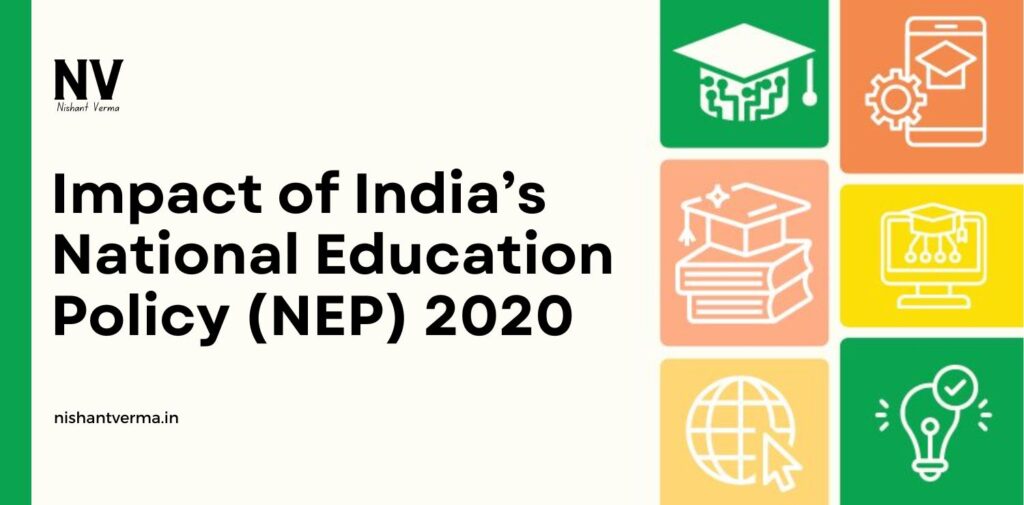India National Education Policy (NEP) 2020 marks a significant shift in the country’s approach to education. The policy, introduced after a gap of more than 34 years, aims to transform India’s education system to meet the demands of the 21st century. It proposes several changes that can have a long-lasting impact on students, teachers, and the overall education framework in India. The NEP 2020 focuses on inclusive, holistic, and multidisciplinary education, which is designed to better prepare the younger generation for the challenges of the future. In this article, we explore the major impacts of the NEP 2020 and how it is expected to shape India’s educational landscape.
Transforming the Structure of Education
One of the most significant impacts of the NEP 2020 is the restructuring of the education system. The policy introduces a new 5+3+3+4 model of education that divides a child’s learning into four stages:
- Foundational Stage (ages 3-8 years)
- Preparatory Stage (ages 8-11 years)
- Middle Stage (ages 11-14 years)
- Secondary Stage (ages 14-18 years)
This restructuring aims to align with the developmental stages of a child’s learning. The foundational stage includes early childhood care and education (ECCE), focusing on play-based learning, which is expected to improve children’s cognitive and emotional skills. By introducing learning at an earlier age, the policy seeks to give children a solid foundation, ensuring they are better equipped to face future academic challenges.
In the preparatory stage, the focus will shift to subjects like mathematics, language, environmental studies, and arts. These stages are designed to provide a well-rounded and comprehensive education to the child, rather than focusing solely on rote learning.

Promoting Multidisciplinary Learning
NEP 2020 places a strong emphasis on multidisciplinary education. It encourages students to learn subjects across disciplines, breaking away from the traditional subject-based approach. This shift promotes a holistic understanding, where students are not limited to one specific area but are exposed to a broad range of knowledge.
For example, under the new policy, students in the secondary stage will have the option to take subjects like arts, science, sports, and vocational studies simultaneously. This flexibility allows students to choose subjects that interest them, leading to a more personalized and engaging learning experience. The multidisciplinary approach also fosters critical thinking, creativity, and problem-solving skills, which are essential for success in today’s rapidly changing world.
Additionally, the NEP encourages the integration of subjects like arts, culture, and sports into the mainstream curriculum. This is aimed at reducing the academic stress often associated with traditional education and promoting overall personality development.
Focus on Skill Development and Vocational Education
The NEP 2020 recognizes the importance of skill development in preparing students for the future workforce. One of the most notable changes in the policy is its strong emphasis on vocational education and skill training, starting as early as the 6th grade. The aim is to make students industry-ready and capable of contributing to the economy in practical ways.
The policy proposes the integration of vocational courses into mainstream education, with students being given the option to choose from a variety of skill development programs. These programs are expected to cover areas such as technology, healthcare, agriculture, and entrepreneurship, equipping students with the skills needed to succeed in various industries.
The policy also promotes the establishment of Vocational Education Institutes (VEIs) to provide specialized training in various trades. This will help bridge the gap between formal education and the skills required by the industry, making students more employable.

Improving Access and Inclusivity
The NEP 2020 places a significant emphasis on making education more inclusive and accessible to all children, irrespective of their background, location, or socioeconomic status. This includes improving access to education for marginalized communities, including children from rural areas, economically disadvantaged families, and children with disabilities.
To promote inclusivity, the policy proposes the setting up of special education zones in underserved areas and ensuring that children from disadvantaged backgrounds receive the necessary support to succeed in school. The focus on digital learning will also play a crucial role in improving access to education for students in remote areas.
The policy also advocates for the inclusion of mother tongue and regional languages in the curriculum, especially in the early stages of education. This will help preserve India’s diverse linguistic heritage while making learning more relevant and meaningful for students.
Teacher Training and Professional Development
The NEP 2020 recognizes that teachers play a crucial role in shaping the future of students. Therefore, one of the key aspects of the policy is the focus on improving teacher training and professional development. The policy proposes the establishment of a National Mission for Mentoring, which will provide teachers with continuous support and guidance throughout their careers.
The aim is to ensure that teachers are not only equipped with subject knowledge but also have the skills to engage students, foster creativity, and create a positive learning environment. Teachers will also be trained in using technology in classrooms to enhance the learning experience.
The NEP emphasizes the importance of teacher autonomy, which allows educators to adapt their teaching methods to suit the needs of their students. This approach is expected to improve the overall quality of education in the country.

Harnessing the Power of Technology
Technology plays a vital role in the NEP 2020, which recognizes that digital tools can enhance both teaching and learning. The policy aims to promote the use of technology to bridge gaps in education, especially in rural and remote areas. The NEP encourages the creation of a Digital Education Framework that will help integrate technology into the curriculum and learning process.
In particular, the policy seeks to enhance the use of online learning platforms, digital resources, and virtual classrooms. This is expected to provide students with greater access to high-quality education, regardless of their geographic location. The policy also advocates for the creation of a National Educational Technology Forum (NETF) to facilitate collaboration among stakeholders and ensure the effective use of technology in education.
Furthermore, the NEP encourages the use of Artificial Intelligence (AI), Machine Learning (ML), and data analytics in education to personalize learning experiences, assess student performance, and track progress. These technological advancements can significantly improve the quality and accessibility of education in India.
Challenges and the Road Ahead
While the NEP 2020 brings about several promising reforms, it is not without challenges. The successful implementation of the policy will require substantial investments in infrastructure, teacher training, and the development of new curricula. One of the biggest challenges will be ensuring that the changes reach the grassroots level, especially in rural and underdeveloped areas where educational resources are often limited.
Additionally, there is the challenge of ensuring that the new system remains equitable, with no student being left behind due to socioeconomic barriers. The policy’s focus on digital education will also require addressing the digital divide, ensuring that all students have access to the necessary technology and internet connectivity.
Despite these challenges, the NEP 2020 has the potential to revolutionize India’s education system by promoting inclusivity, skill development, and holistic learning. If successfully implemented, it can empower students with the knowledge and skills needed to thrive in an increasingly competitive and interconnected world.
Conclusion: India National Education Policy
India National Education Policy 2020 is a bold step forward in transforming the country’s education system. Its focus on early childhood care, skill development, inclusivity, teacher training, and the integration of technology makes it a comprehensive and forward-thinking policy. While challenges remain in its implementation, the NEP 2020 has the potential to create a more equitable and dynamic education system that meets the needs of the 21st century and prepares students for the future.




